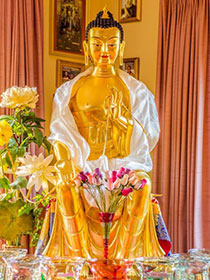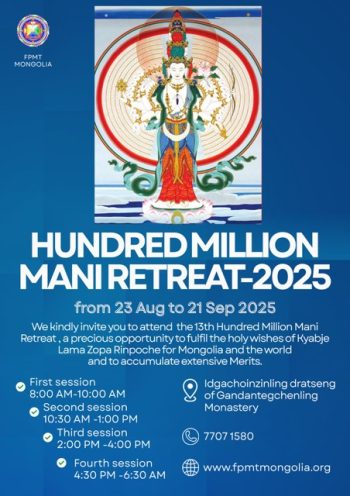- Home
- FPMT Homepage
Foundation for the Preservation of the Mahayana Tradition
The FPMT is an organization devoted to preserving and spreading Mahayana Buddhism worldwide by creating opportunities to listen, reflect, meditate, practice and actualize the unmistaken teachings of the Buddha and based on that experience spreading the Dharma to sentient beings. We provide integrated education through which people’s minds and hearts can be transformed into their highest potential for the benefit of others, inspired by an attitude of universal responsibility and service. We are committed to creating harmonious environments and helping all beings develop their full potential of infinite wisdom and compassion. Our organization is based on the Buddhist tradition of Lama Tsongkhapa of Tibet as taught to us by our founders Lama Thubten Yeshe and Lama Thubten Zopa Rinpoche.
- Willkommen
Die Stiftung zur Erhaltung der Mahayana Tradition (FPMT) ist eine Organisation, die sich weltweit für die Erhaltung und Verbreitung des Mahayana-Buddhismus einsetzt, indem sie Möglichkeiten schafft, den makellosen Lehren des Buddha zuzuhören, über sie zur reflektieren und zu meditieren und auf der Grundlage dieser Erfahrung das Dharma unter den Lebewesen zu verbreiten.
Wir bieten integrierte Schulungswege an, durch denen der Geist und das Herz der Menschen in ihr höchstes Potential verwandelt werden zum Wohl der anderen – inspiriert durch eine Haltung der universellen Verantwortung und dem Wunsch zu dienen. Wir haben uns verpflichtet, harmonische Umgebungen zu schaffen und allen Wesen zu helfen, ihr volles Potenzial unendlicher Weisheit und grenzenlosen Mitgefühls zu verwirklichen.
Unsere Organisation basiert auf der buddhistischen Tradition von Lama Tsongkhapa von Tibet, so wie sie uns von unseren Gründern Lama Thubten Yeshe und Lama Thubten Zopa Rinpoche gelehrt wird.
- Bienvenidos
La Fundación para la preservación de la tradición Mahayana (FPMT) es una organización que se dedica a preservar y difundir el budismo Mahayana en todo el mundo, creando oportunidades para escuchar, reflexionar, meditar, practicar y actualizar las enseñanzas inconfundibles de Buda y en base a esa experiencia difundir el Dharma a los seres.
Proporcionamos una educación integrada a través de la cual las mentes y los corazones de las personas se pueden transformar en su mayor potencial para el beneficio de los demás, inspirados por una actitud de responsabilidad y servicio universales. Estamos comprometidos a crear ambientes armoniosos y ayudar a todos los seres a desarrollar todo su potencial de infinita sabiduría y compasión.
Nuestra organización se basa en la tradición budista de Lama Tsongkhapa del Tíbet como nos lo enseñaron nuestros fundadores Lama Thubten Yeshe y Lama Zopa Rinpoche.
A continuación puede ver una lista de los centros y sus páginas web en su lengua preferida.
- Bienvenue
L’organisation de la FPMT a pour vocation la préservation et la diffusion du bouddhisme du mahayana dans le monde entier. Elle offre l’opportunité d’écouter, de réfléchir, de méditer, de pratiquer et de réaliser les enseignements excellents du Bouddha, pour ensuite transmettre le Dharma à tous les êtres. Nous proposons une formation intégrée grâce à laquelle le cœur et l’esprit de chacun peuvent accomplir leur potentiel le plus élevé pour le bien d’autrui, inspirés par le sens du service et une responsabilité universelle. Nous nous engageons à créer un environnement harmonieux et à aider tous les êtres à épanouir leur potentiel illimité de compassion et de sagesse. Notre organisation s’appuie sur la tradition guéloukpa de Lama Tsongkhapa du Tibet, telle qu’elle a été enseignée par nos fondateurs Lama Thoubtèn Yéshé et Lama Zopa Rinpoché.
Visitez le site de notre Editions Mahayana pour les traductions, conseils et nouvelles du Bureau international en français.
Voici une liste de centres et de leurs sites dans votre langue préférée
- Benvenuto
L’FPMT è un organizzazione il cui scopo è preservare e diffondere il Buddhismo Mahayana nel mondo, creando occasioni di ascolto, riflessione, meditazione e pratica dei perfetti insegnamenti del Buddha, al fine di attualizzare e diffondere il Dharma fra tutti gli esseri senzienti.
Offriamo un’educazione integrata, che può trasformare la mente e i cuori delle persone nel loro massimo potenziale, per il beneficio di tutti gli esseri, ispirati da un’attitudine di responsabilità universale e di servizio.
Il nostro obiettivo è quello di creare contesti armoniosi e aiutare tutti gli esseri a sviluppare in modo completo le proprie potenzialità di infinita saggezza e compassione.
La nostra organizzazione si basa sulla tradizione buddhista di Lama Tsongkhapa del Tibet, così come ci è stata insegnata dai nostri fondatori Lama Thubten Yeshe e Lama Zopa Rinpoche.
Di seguito potete trovare un elenco dei centri e dei loro siti nella lingua da voi prescelta.
- 欢迎 / 歡迎
简体中文
“护持大乘法脉基金会”( 英文简称:FPMT。全名:Foundation for the Preservation of the Mahayana Tradition) 是一个致力于护持和弘扬大乘佛法的国际佛教组织。我们提供听闻,思维,禅修,修行和实证佛陀无误教法的机会,以便让一切众生都能够享受佛法的指引和滋润。
我们全力创造和谐融洽的环境, 为人们提供解行并重的完整佛法教育,以便启发内在的环宇悲心及责任心,并开发内心所蕴藏的巨大潜能 — 无限的智慧与悲心 — 以便利益和服务一切有情。
FPMT的创办人是图腾耶喜喇嘛和喇嘛梭巴仁波切。我们所修习的是由两位上师所教导的,西藏喀巴大师的佛法传承。
繁體中文
護持大乘法脈基金會”( 英文簡稱:FPMT。全名:Found
ation for the Preservation of the Mahayana Tradition ) 是一個致力於護持和弘揚大乘佛法的國際佛教組織。我們提供聽聞, 思維,禪修,修行和實證佛陀無誤教法的機會,以便讓一切眾生都能 夠享受佛法的指引和滋潤。 我們全力創造和諧融洽的環境,
為人們提供解行並重的完整佛法教育,以便啟發內在的環宇悲心及責 任心,並開發內心所蘊藏的巨大潛能 — 無限的智慧與悲心 – – 以便利益和服務一切有情。 FPMT的創辦人是圖騰耶喜喇嘛和喇嘛梭巴仁波切。
我們所修習的是由兩位上師所教導的,西藏喀巴大師的佛法傳承。 察看道场信息:
- FPMT Homepage
- News/Media
-
- Study & Practice
-
-
- About FPMT Education Services
- Latest News
- Programs
- New to Buddhism?
- Buddhist Mind Science: Activating Your Potential
- Heart Advice for Death and Dying
- Discovering Buddhism
- Living in the Path
- Exploring Buddhism
- FPMT Basic Program
- FPMT Masters Program
- FPMT In-Depth Meditation Training
- Maitripa College
- Lotsawa Rinchen Zangpo Translator Program
- Universal Education for Compassion & Wisdom
- Online Learning Center
-
- Prayers & Practice Materials
- Overview of Prayers & Practices
- Full Catalogue of Prayers & Practice Materials
- Explore Popular Topics
- Benefiting Animals
- Chenrezig Resources
- Death & Dying Resources
- Lama Chopa (Guru Puja)
- Lama Zopa Rinpoche: Compendium of Precious Instructions
- Lama Zopa Rinpoche: Life Practice Advice
- Lama Zopa Rinpoche Practice Series
- Lamrim Resources
- Mantras
- Prayer Book Updates
- Purification Practices
- Sutras
- Thought Transformation (Lojong)
- Audio Materials
- Dharma Dates - Tibetan Calendar
- Translation Services
- Publishing Services
- Ways to Offer Support
- Prayers & Practice Materials
-
- Teachings and Advice
- Find Teachings and Advice
- Lama Zopa Rinpoche Advice Page
- Lama Zopa Rinpoche: Compendium of Precious Instructions
- Lama Zopa Rinpoche Video Teachings
- ༧སྐྱབས་རྗེ་བཟོད་པ་རིན་པོ་ཆེ་མཆོག་ནས་སྩལ་བའི་བཀའ་སློབ་བརྙན་འཕྲིན།
- Podcasts
- Lama Yeshe Wisdom Archive
- Buddhism FAQ
- Dharma for Young People
- Resources on Holy Objects
- Teachings and Advice
-
-
*If a menu item has a submenu clicking once will expand the menu clicking twice will open the page.
-
-
- Centers
-
- Teachers
-
- Projects
-
-
-
-
*If a menu item has a submenu clicking once will expand the menu clicking twice will open the page.
-
-
- FPMT
-
-
-
-
-
The greatest problems of humanity are psychological, not material. From birth to death, people are continually under the control of their mental sufferings.
Lama Zopa Rinpoche
-
-
-
- Shop
-
-
-
The Foundation Store is FPMT’s online shop and features a vast selection of Buddhist study and practice materials written or recommended by our lineage gurus. These items include homestudy programs, prayers and practices in PDF or eBook format, materials for children, and other resources to support practitioners.
Items displayed in the shop are made available for Dharma practice and educational purposes, and never for the purpose of profiting from their sale. Please read FPMT Foundation Store Policy Regarding Dharma Items for more information.
-
-
FPMT Community: Stories & News
19
Please Enjoy Our September 2025 e-News
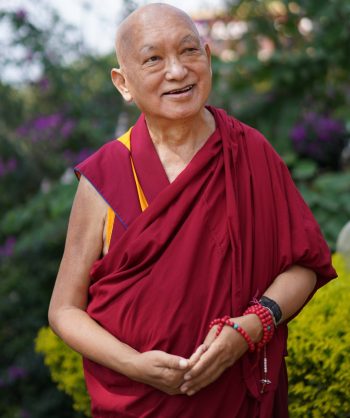
Lama Zopa Rinpoche in the garden at Kopan Monastery, Nepal, October 2020. Photo by Ven. Lobsang Sherab.
Our September e-News is now available and we are sharing news, resources, and causes for rejoicing including:
- Sutra of Golden Light for World Peace
- Teachings from Lama Zopa Rinpoche and Lama Yeshe
- An update from the FPMT Inc. Board
- Grants offered to health care and essential services
- Grants offered for animal blessings and rescue from untimely death
- Resources and opportunities for study and practice
- Job opportunities in the FPMT organization including FPMT International Office’s search for a new Executive Director
and much more!
Please read this month’s e-news in its entirety.
Have the e-News translated into your native language by using our convenient translation facility located on the right-hand side of the page.
Visit our subscribe page to receive the FPMT International Office News directly in your email inbox.
- Tagged: fpmt enews
12
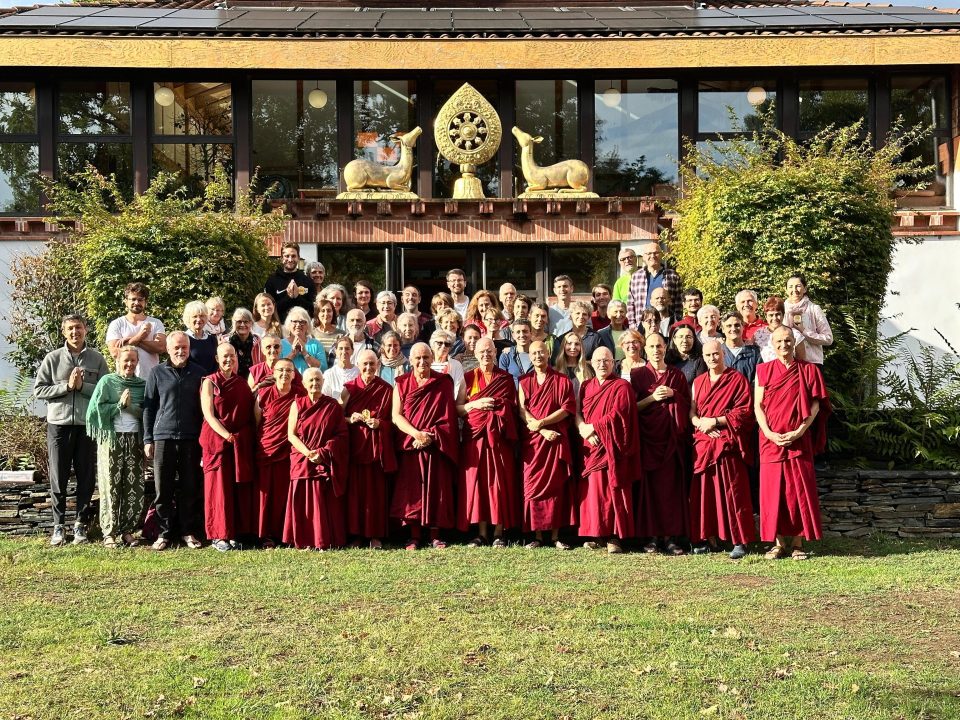
Participants in the calm-abiding and lamrim retreat led by Ven. Rene Feusi at Nalanda Monastery in August. Photo courtesy of Nalanda Monastery.
Sixty-eight participants attended a calm-abiding and lamrim retreat led by Ven. René Feusi at Nalanda Monastery, France, from August 15-30, 2025. Based on his own extensive meditative practice, Ven. René explained various topics such as guru devotion, various levels of emptiness, bodhicitta, and calm-abiding and awareness in daily life. “By his mere presence,” Ven. Sherab of Nalanda Monastery shared, “he also directly shared his own experience beyond the intellect: just being that stillness of the mind for a while and feeling the freedom—once the heavy burden—of the hallucination of inherent existence slightly dissolve, like the morning fog slowly disappearing in the rising sun.”
Most of the participants who had followed a ten day retreat with Ven. René at Nalanda in 2024 said that during this longer retreat, Ven. René went deeper and deeper into the topics. “We all have requested Ven. René to come back next year, maybe for a bit longer period of time, hopefully for an even deeper experience,” Ven. Sherab shared.
From the Archive: We also want to take the opportunity to share an interview Ven. Robina Courtin conducted with Ven. René Feusi in 1996 for Mandala magazine, regarding his 2.5 year retreat in Spain.
We welcome the submission of news stories from those within the FPMT community. This can be a story about something you have personally completed or accomplished, about someone else who has done so, or about the FPMT center, project, or service of which you are a part. Ideal submissions will give readers reasons to rejoice, share ideas, and create connections between those in the international community. Have something to share? Please let us know!
Foundation for the Preservation of Mahayana Tradition (FPMT), is a Tibetan Buddhist organization dedicated to the transmission of the Mahayana Buddhist tradition and values worldwide through teaching, meditation and community service.
- Tagged: nalanda monastery, retreat, ven. rene feusi
4
One of Lama Zopa Rinpoche’s Vast Visions for the FPMT organization is to establish 100 Million Mani Retreats (100,000 recitations of 100 million OM MANI PADME HUM) around the world.
For the thirteenth year, FPMT Mongolia is currently hosting a 100 Million Mani Retreat and online participation is welcome! This retreat started August 23 and will continue through September 21.
The sessions are livestreamed on FPMT Mongolia’s Facebook page, and you can tune in anytime. Any level of participation is wonderful, but you are encouraged to complete at least one Chenrezig sadhana per day for the duration of the retreat if you are able, but this of course is not compulsory. However, please only include the mantras you recited within the practice of the sadhana, in your final mantra count.
A short Chenrezig sadhana as well as precious virtual Mani Retreat teachings are available to all.
Please check the FPMT Mongolia Facebook page for information on how to report your mantras once this becomes available.
Please rejoice in the incredible effort to generate unbelievable merit for the FPMT organization, for the fulfillment of Lama Zopa Rinpoche’s Vast Visions, and for the cultivation of loving-kindness in the hearts of all.
Foundation for the Preservation of Mahayana Tradition (FPMT), is a Tibetan Buddhist organization dedicated to the transmission of the Mahayana Buddhist tradition and values worldwide through teaching, meditation and community service.
- Tagged: 100 million mani retreat, fpmt mongolia
3
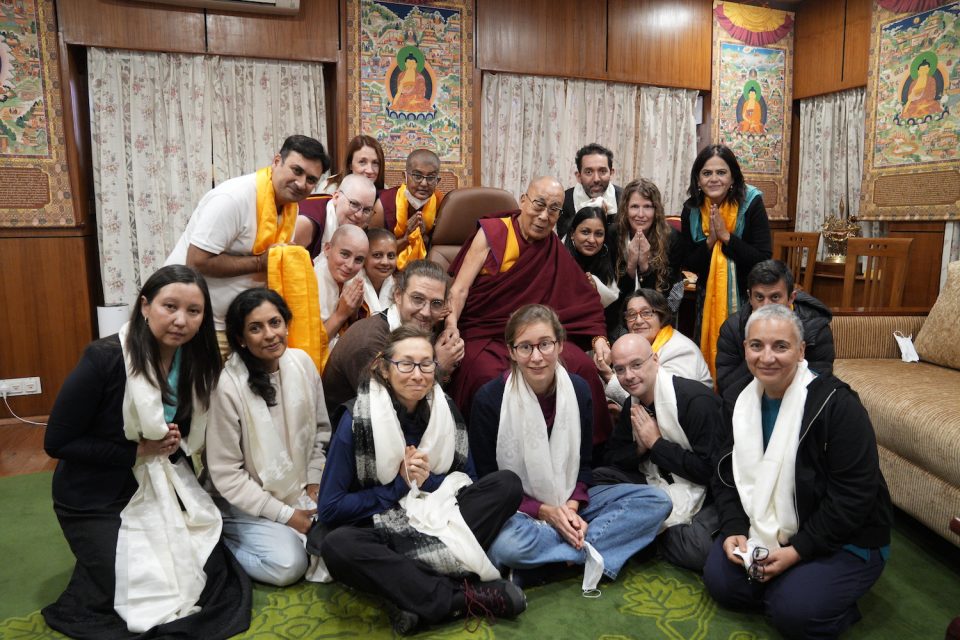
Members of the UBI/ILTK debate class meeting His Holiness the Dalai Lama in Dharamsala, India, 2022, who expressed his joy that we were learning Nalanda debate in their own languages.
The tradition of Buddhist debate originated in Nalanda University in the 5th century CE in Bihar, India. The historical Buddha, Shakyamuni, famously encouraged students to investigate the teachings through reasoning, saying, “Do not accept what I say on faith, but test it as a goldsmith tests gold—cutting it, rubbing it, melting it—and only then accept it as valid.” Nalanda Tradition Debate is a framework designed to expose inner doubts and contradictions as one tests the Buddha’s teachings with one’s own experiences, with the intention of leading both oneself and others to valid cognitions of reality and the realization of emptiness. It is dynamic, relevant, and practical in everyday life —and only recently became available in languages other than Tibetan.
Two current students of the Nalanda debate course offered by The Italian Buddhist Union (UBI) in cooperation with Istituto Lama Tzong Khapa, Ven. Thubten Chöying and Henrik Frölund share with us some insightful perspectives on the topic below:
Is Nalanda debate for me?
If you’re familiar with Nalanda Tradition Debate, you might not have gotten involved because it seems like something only done in monasteries or only in Tibetan. Maybe you didn’t know there are growing opportunities to learn in English and other languages. Or maybe it just seems too intellectual and complicated. Perhaps you’re not familiar with it at all, and aren’t sure how to learn more.
We thought we could help address those concerns along with our fifth year international classmates in the online Nalanda debate program originally created by Istituto Lama Tzong Khapa and taught by Dr. Atisha Mathur with the help of tutors Ven. Tenzin Drolma, Ven. Tenzin Kunsang, and others. While we are mostly describing this program, many of us have participated in other additional shorter debate programs, and so are including those experiences as well.
Is Nalanda debate needed when I’ve done Buddhist study already?
Consider the benefits of learning debate with an excellent teacher, as described by Bee Lan Lim (USA): “Joining the ILTK debate course was one of the best decisions I made in studying Buddhism. I realized then I had done it backwards, and the class filled a major gap, especially when it was taught by Atisha Mathur. Atisha-la has a brilliant mind and a brilliance with words. His debate classes trained me to properly investigate Buddha’s teachings before accepting them. I think everyone should learn debate as a way to learn critical thinking. It is a basic skill to debunk lies that we tell ourselves and others.”
Also, Shmuel Ruppo (Israel) said, “I study debate in general, and with Atisha specifically, because it enables me to be challenged on my understanding of Dharma. Often, my understanding is lacking—whether uncertain, vague, imprecise, just plain wrong, or even contradictory to what the texts say or to basic facts about reality! Putting my understanding on the spot, with me trying to defend it and others challenging me, makes it much more likely for me to change my understanding …
“For example, I can find out that I hold a position strongly, but for no reason at all – just by virtue of it being said often enough by my teachers. It requires help from the outside to make this crystal clear to me, and actually begin to seek necessary reasons for my views.”
Rimpi Jindal (India) tells us how, after many years of studying the Dharma: “It changed a lot. Before, I thought Dharma was mostly about learning the teachings and trying to follow them. But through debate, I realized it’s actually a very investigative process. You’re encouraged to question everything, analyze, and reason it out for yourself. That gave me so much confidence because it’s not blind faith – it’s about understanding deeply. Now I see Dharma as something alive, something you can really test and apply in everyday life.”
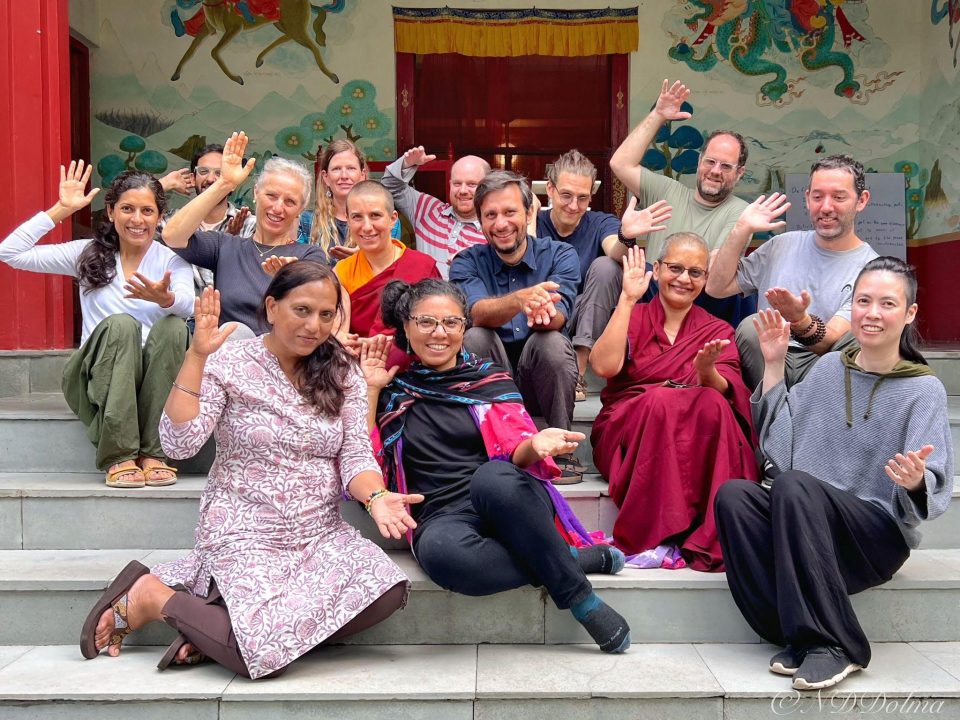
Celebrating another successful debate retreat with students from three different years at Thösamling Nunnery, Dharamshala, 2024. Photo courtesy of Thösamling Nunnery, Institute, and Retreat Center.
Is Nalanda debate only for Buddhists?
The practice and topics of debate are both used to engage with reality and question our assumptions regarding what we perceive, which is important regardless of whether someone is Buddhist or not.
“As a non-Buddhist,” Sabrina Zanetti (Italy) explained, “I can recommend debate to anyone interested in fostering a clearer, more critical mind. It is not necessary to have studied Buddhist topics previously: all the necessary information is provided gradually by the teachers. Step by step we grow to understand that a large part of the information normally used to make decisions or make judgments is taken for granted. What seemed like solid ground becomes unstable, and people look for different reasons to support their beliefs. We gain a method to give ourselves a more conscious orientation in the bombardment of information to which we are subjected. And on top of all this, Atisha Mathur is a teacher who presents topics that have been studied in depth for a long time with great passion and enthusiasm, with the help of valid tutors and sharing a path in a climate of great collaboration with the other students.”
Is Nalanda debate too intellectual to be helpful to me?
While words like “logic,” “reasoning,” “valid cognition,” and even “debate” sound like topics that would only interest intellectuals and erudite scholars, in the Tibetan monasteries and nunneries, even young teens learn Nalanda debate.
Karen D.C. (Belgium) found that debate helps in all her decision-making. “Debate is helpful for those who, like me, overthink and doubt a lot about small or large decisions in life. I used to desperately want to give ‘the right answer’ and then be undecisive, but through debating I have noticed that it is better to give a ‘wrong’ answer than to not answer. When an answer doesn’t work, that will become clear as the debate continues and then I can change my mind. But if I don’t answer, nothing becomes clear. Experiencing that in debate, made it easier for me to take other decisions more lightly as well…Also I find [I’m] learning to really think for myself and not be swayed just because many other people say otherwise.”
“For me,” Rimpi added, “the most rewarding thing has been noticing little changes in how I respond to life. I still have ups and downs, but things that used to really upset me don’t feel as heavy anymore. I pause more before reacting and sometimes I actually choose patience or kindness when before I would’ve gotten annoyed. It’s those small shifts that feel so powerful because they show that the practice is working, it’s not just theory, it’s changing how I live.”
Is Nalanda debate just like having a discussion?
It is amazing how many arguments start with two people having different definitions of the same term – which means that they are actually discussing two different things. On top of that, they have no structure where these discrepancies come to light and thus frustration and anger develop.
Naga Dhoopati (USA) sees it like this: “In normal society or in our political debates, we see [discussions and] debates become one person making statements to please their audience or oppose the other person, without any valid reasoning. In Nalanda debate, one is not trying to win over the other person or get cheers from the audience by making a statement. Here you are taking the responsibility of pulling the other person out of samsara through valid reasoning and making them look at a statement, a syllogism, with different possibilities.”
Is Nalanda debate too conceptual? I like to meditate.
The connection between meditation and debate is perhaps not clear to everyone, and some even believe them to be in contradiction. Common misperceptions about meditation are that the purpose is simply to empty the mind of thoughts, or that liberation can be attained through only concentration meditation. According to the Buddha’s teachings, to realize emptiness, it’s necessary to combine concentration and analysis. In order to understand why this is necessary for liberation, one needs to use conception to analyze the teachings. Nalanda Debate is a powerful and effective method designed exactly for these purposes.
Elroy Fernandes (India) expressed how debate benefitted his meditation. “My debate practice has enhanced my ability to grasp the object of meditation. While I don’t claim full understanding, it has become easier for me to identify the object when contemplating non-self. I credit this clearer insight to my experience with debate.”
Sabrina agreed that “The conceptual mind must be overcome. But,” she continued, “for me it is an indispensable tool for analyzing how to overcome it. Choosing the right path to obtain a result is not an easy choice: the aspects of the path itself and its object must be clearly identified. The best tool to do all this is a detailed analysis, and the debate teaches me exactly this. In a second moment, once I have identified the object, I will be able to make it an instrument of my meditation. Without forgetting that the debate, requiring concentration on its object, is already a form of meditation. They are not two separate paths, two different and contradictory ways of obtaining a result. Instead, they are in close collaboration, indeed. In my opinion, debate is really necessary, because it helps to identify errors and eliminate them.”
Henrik (one of the authors), shares his view on the subject: “In the end, all meditation will be an effect of some form of reasoning since you need to have a reason to sit there in the first place. Faulty reasoning with regards to the goal of your practice will at some point produce a doubt in your mind and at that point the debate starts again. We can’t just suppress the doubts with ‘Buddha said so’ or some ready-made statement from a teacher – it might distract your doubting mind for a while, but in the end only correct reasoning resulting in inferential valid cognition will be enough.”
As Zarina Osmonalieva (Sweden) puts it: “I really recommend everyone who is studying Dharma to understand the basic principles of debate and put aside fears that it is too intellectual or too conceptual. Without changing the rational mind, according to Buddhist psychology, it is very difficult to develop deep realizations.”
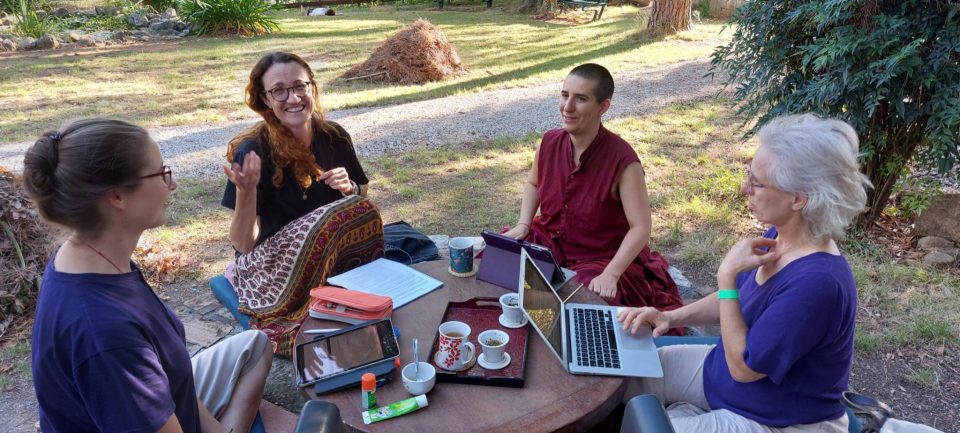
Ven. Lobsang Kunsang tutoring students in the ILTK tea garden during an in-person retreat. Photo courtesy of Ven. Thubten Chöying.
Do I need Nalanda debate when I already have excellent teachers?
No doubt there are excellent teachers giving precious and complete teachings, but are we always the best listeners?
Karen D.C. describes an interesting analogy from His Holiness. “Over the course of the years, I have noticed a gradual change in the way I was listening to dharma teachings. Even though I didn’t really notice at that time, I used to accept quite a lot of what was said blindly. I investigated in some ways, but I lacked the ability to properly question and investigate. His Holiness often makes the analogy of eating without teeth.
After learning debate for some time, I started to notice how many things actually weren’t clear to me during Dharma teachings, how many doubts I had, how many open questions were remaining. I really started to miss the debate approach when it wasn’t there. I felt uncomfortable leaving all these doubts unaddressed. His Holiness compares approaching the Buddha’s teaching using debate to having teeth to eat food, one is able to chew the teachings and investigate them. This is how I felt and still feel, and I am really grateful for that.”
Seeing it as the key to staying with her studies, Patrizia Miroballo (Italy) said, “As for the study of the Dharma, I probably would not have continued for a long time without logic and debate, because I feel that, for me, it is the only way I can have the opportunity to understand things correctly and in a deeper way.”
Erez (Israel) sees a marked difference in his engagement with the Dharma. “My personal experience is you get to develop the ability to understand the philosophical debates way deeper than before. Now I’m able to actually dissect parts of text and argue for and against its meaning rather that just memorise what Geshe-la said and hope not to forget it. Highly recommended but bring patience with you.”
Is Nalanda debate real practice? I want Dharma experiences.
Whether our practice is working or not comes down to how it affects our daily life, and students have seen very practical results. The real work is in the mind, and speaking candidly, Shmuel shared how, “If a view feels emotionally rewarding, it is easy to strongly hold it without good reason. But if something is true, it does not follow that it will necessarily feel pleasant – the interaction in debate can act as bitter medicine to realize that one’s understanding is actually wrong.”
Patrizia found that, “At the beginning, the debate was a real surprise: such a fun way to study difficult topics and at the same time to train the mind in becoming more sharp and clear!
In ordinary life it happened that I had a better ability to evaluate situations in detail and quickly find the best solutions.”
Naga saw many positive changes in her daily life. “In my out-of-the-classroom experiences, I realized how the debate study has helped me articulate right speech in work environments, improve my listening skills, analyze better, and help others in their health and well-being…It has been a wonderful opportunity to study with so many wonderful students, who became best of friends through these debate courses.”
Rimpi related a personal change in her view that happened during debate: “One of my best memories is from a debate session where I learned about the concept of ‘isolates.’ While debating, I realized that a person can have many different roles or identities at the same time. We often have high expectations from our friends and family, but we don’t always understand the different roles they might be juggling. Learning about this concept and applying it in real life helped me see things more clearly and helped me to improve my relationship with friends and family. That moment was both exciting and humbling, and it truly changed the way I approached debates after that.”
Maybe Nalanda debate is not for me.
In a way, that is exactly right, because it is the best method for realizing selflessness – there’s no inherent “me” that it’s for. On the compassion side, if we are developing a genuine understanding of emptiness, it will only help to soften our hearts as well, and bring us closer to others.
Venerable Tenzin Paldron (India) shares: “Although I still feel very much like a novice trying to find her feet in the marshy swamp of my afflictions, I am very grateful for the opportunity I received over the years, to develop this essential tool of logic and reasoning to see things more clearly and compassionately.
It has also enhanced within me a willingness and a determination to do whatever it takes to continue to hone this skill to attain fearlessness and happiness for myself and for others, thus fulfilling the wishes of His Holiness the Dalai Lama and my teachers to become a genuine 21st century spiritual practitioner.”
Exploring Nalanda Debate Further
Here are some ways you can learn debate and see if it benefits your practice in the ways discussed above.
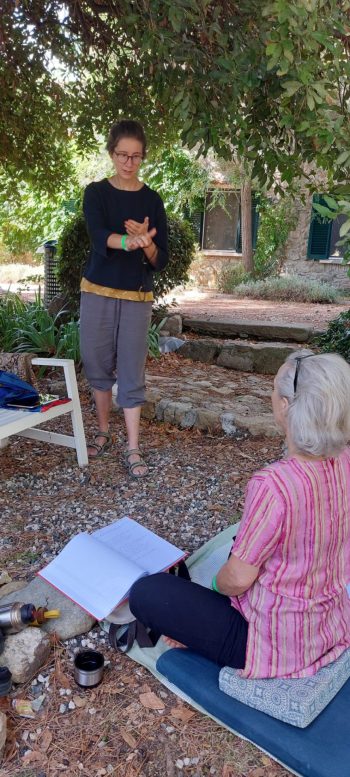
Karen De Causmaecker challenges classmate Paola Zuin while debating in ILTK’s tea garden. Photo courtesy of Ven. Thubten Chöying.
The Art of Reasoning in the Nalanda Tradition, Italy
The course created by ILTK is now offered by The Italian Buddhist Union (UBI) in cooperation with ILTK, Italy and offered in both English and Italian, online with annual in-person retreat.
When: Online open day on September 5/6; classes start October 2025
Teacher and Tutors: Dr. Atisha Mathur, Ven. Lobsang Kunsang, Duccio Pescini, Henrik Frölund
Please learn more about this course.
Exploring the Fundamentals of Reasoning and Debate at Ocean of Compassion, CA, USA
This course offered by Ocean of Compassion Buddhist Center is available online and in-person
When: Starting September 15
Teacher: Geshe Tenzin Legtsok
Please learn more about this course.
Debate School at Sera Je Monastery, India
Programs available online and in-person.
Teachers and Coaches: Geshe Thabkhe, Ven. Losang Donyo, Ven. Lobsang Kunzang, Ven. Tenzin Lekzom, Archhana Kombrabail, and other monk coaches and mentors.
Please learn more about the Sera Je Debate School.
We gratefully thank Ven. Thubten Chöying and Henrik Frölund for this thoughtful piece about Nalanda debate!
Ven. Thubten Chöying (Sarah Brooks, USA) is an IMI nun, a current student of UBI/ILTK’s online debate course and ILTK’s FPMT Masters Program, board member of Associazione Monastica Sangha Lhungtok Choekhorling, former Foundation Service Seminar and Inner Job Description trainer, and has served in FPMT centers and projects since 1998.
Henrik Frölund (Sweden) is a student of UBI/ILTK’s Debate Course since 2021, and is also a tutor for the newer students of that program.
We welcome the submission of news stories from those within the FPMT community. This can be a story about something you have personally completed or accomplished, about someone else who has done so, or about the FPMT center, project, or service of which you are a part. Ideal submissions will give readers reasons to rejoice, share ideas, and create connections between those in the international community. Have something to share? Please let us know!
Foundation for the Preservation of Mahayana Tradition (FPMT), is a Tibetan Buddhist organization dedicated to the transmission of the Mahayana Buddhist tradition and values worldwide through teaching, meditation and community service.
- Tagged: debate, nalanda debate
29
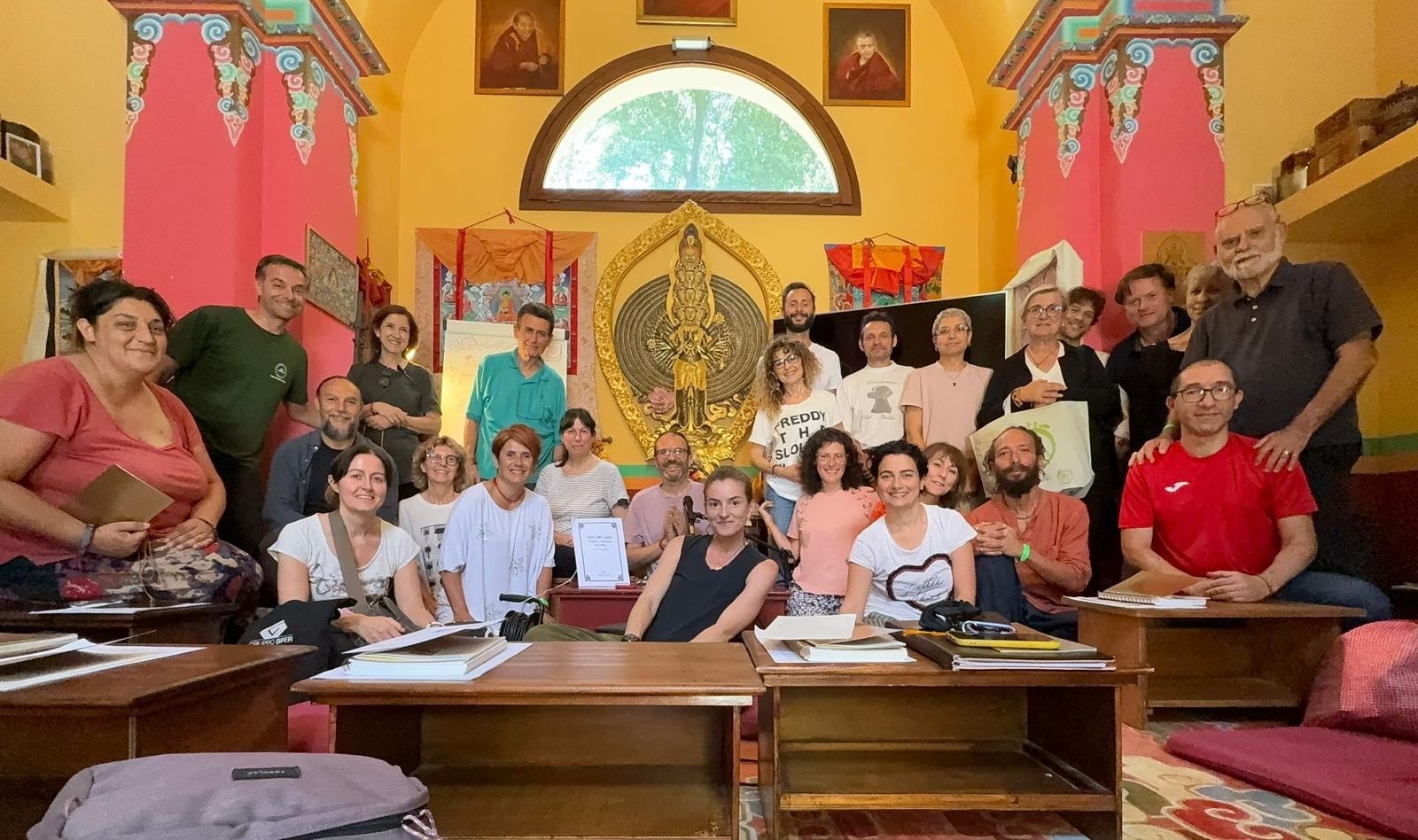
Some of the participants of the first Heart Sutra retreat in Europe, with retreat leader Stefano Gaviglio, center, in the Chenrezig Gompa at Istituto Lama Tzong Khapa, Italy, July 27, 2025.
In July 2022, Lama Zopa Rinpoche expressed his wish to lead a Heart Sutra Retreat, but did not do so before showing the aspect of passing away in April 2023. To honor the first anniversary of Rinpoche’s parinirvana and to fulfill his wishes, the first Heart Sutra Retreat was offered at Kopan Monastery, Nepal from April 15-20, 2024. The momentous retreat was attended by over 200 students, with Ganden Trisur Lobsang Tenzin Rinpoche providing commentary on the text, and Ven. Steve Carlier guiding meditations on the topic. Short video recordings of Lama Zopa Rinpoche teaching on emptiness were shown in the evening sessions. Continuing on in this spirit, the first European Heart Sutra Retreat, following Lama Zopa Rinpoche’s instructions, was held at Istituto Lama Tzong Khapa (ILTK) in Italy in July 2025. Below is an inspired report from two staff members of ILTK.
By Carlota Pinheiro and Fabiana Lotito
The Innovative Retreat
On Sunday, July 27, 2025 at Istituto Lama Tzong Khapa (ILTK) in Pomaia, Italy, the first European Heart Sutra meditation retreat was completed, according to Lama Zopa Rinpoche’s instructions.
FPMT registered teacher Stefano Gaviglio, who attended the first Heart Sutra Retreat in April 2024 at Kopan Monastery in Nepal, led by Ven. Steve Carlier, proposed this retreat, creating an innovative structure that honored the lineage instructions while accommodating modern learning needs—modulating it into two long weekends separated by approximately two months, interspersed with six weekly online meditations. The result was a unique program that would guide approximately 40 participants through the profound depths of the Heart Sutra’s teachings on emptiness over several weeks. This format allowed participants to deepen their understanding progressively, moving from the correct recognition of the object of negation to Chandrakirti’s sophisticated seven-fold reasoning on emptiness.
The Traditional Program
The first weekend, after providing essential theoretical context for newcomers, began with sharing Lama Zopa Rinpoche’s oral transmission of the sutra, followed by intensive meditation on the “four profundities” up to the aggregate of feelings. As an auspicious conclusion, participants received explanations of the Heart Sutra’s mantra and its embedded five paths of realization.
The intervening weeks proved crucial to the program’s success. Six online sessions maintained momentum and allowed participants to integrate their weekend experiences into daily practice. These sessions specifically focused on meditations providing the foundation necessary for the more advanced practices that would follow.
The second weekend built upon this groundwork, beginning with meditations on the emptiness of the person’s inherent existence before expanding to explore the four profundities in relation to all five aggregates. The program culminated in meditations on the Eight Aspects of Emptiness as they relate to the Three Doors of Liberation, before completing the sutra to Buddha’s final expression of joy. Throughout both weekends, even break periods were conducted in awareness of emptiness, following Lama Zopa Rinpoche’s specific instructions for maintaining contemplative focus.
Each day of the retreats began with preliminary practices including the Guru Yogas of Lama Tsongkhapa and Avalokiteshvara, incorporating the “All-encompassing Yoga Mind” meditation as recommended by His Holiness the Dalai Lama. Formal recitation sessions were preceded by traditional prayers, including Praise to Manjushri and invocations to the lineage lamas, ensuring authentic connection to the unbroken transmission of these teachings by Lama Zopa Rinpoche.
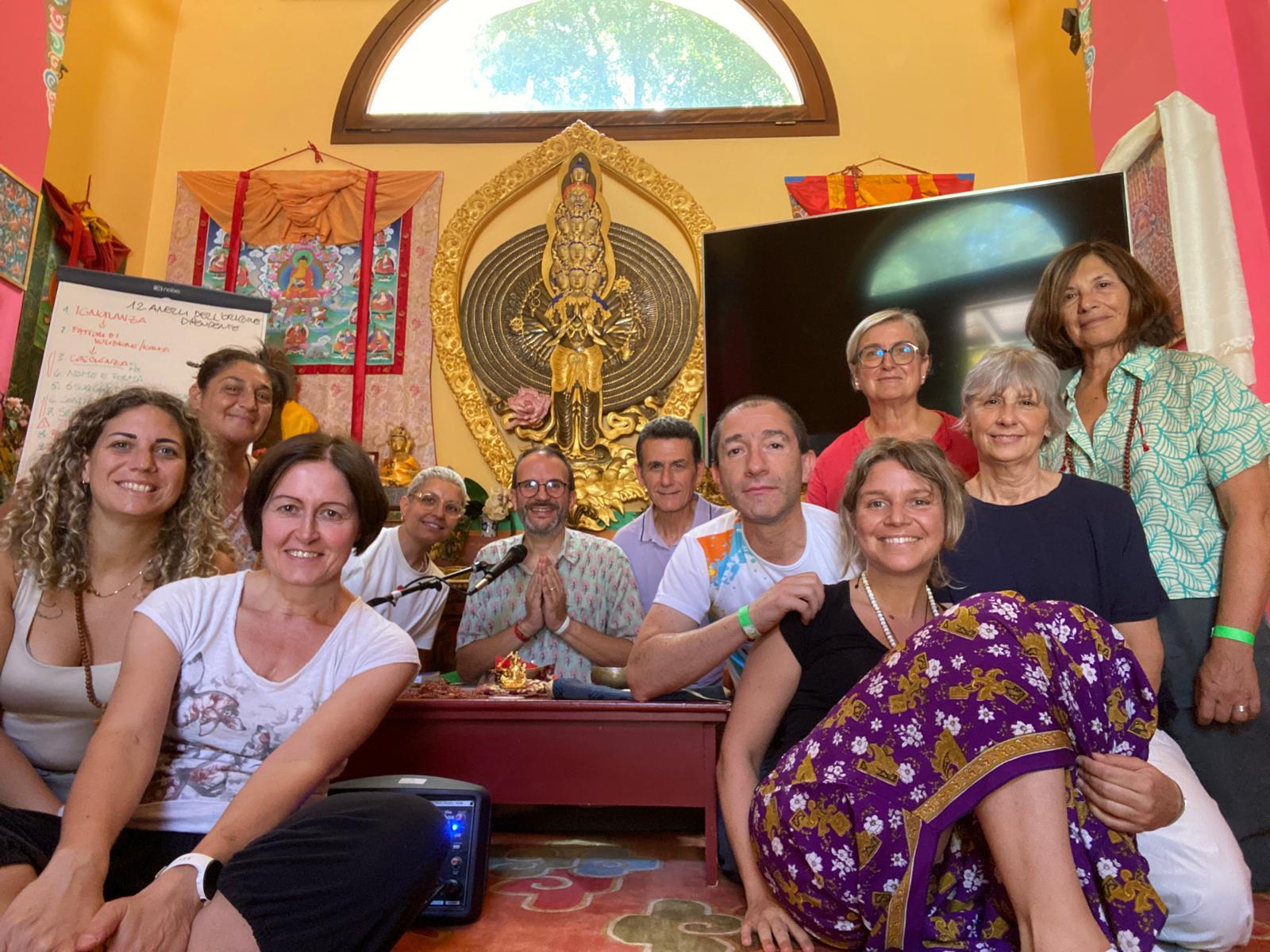
Retreat leader Stefano Gaviglio, center, with some of the second Heart Sutra retreat repeating participants, Istituto Lama Tzong Khapa, Italy, July 27, 2025.
Community Impact
The retreat attracted a remarkably diverse group of practitioners, presenting both opportunities and challenges. Among the 32 core participants were five complete beginners who had never encountered fundamental Buddhist concepts. This diversity reflected the retreat’s appeal but also highlighted the need for prerequisites in future programs. The teacher’s ability to accommodate such varied experience levels while maintaining the integrity of Lama Zopa Rinpoche’s instructions demonstrated both pedagogical skill and the teachings’ inherent accessibility when properly presented.
“There would be so much to say! But if I wrote them down, the words would be like a jar trying to contain the breeze… So the best to say is an infinite thank you, from the bottom of my heart, for these precious teachings and for having fostered a beautiful sharing environment,” said participants Sonia and Anna.
he first weekend group contributed over 10,800 mantras toward the global accumulation for His Holiness the Dalai Lama’s 90th birthday celebration, with the final count reaching 47,600 mantras. Both groups completed the recitation of Manjushri’s holy names, dedicating these accumulations to the swift recognition of Lama Zopa Rinpoche’s perfect reincarnation. Each evening concluded with viewing carefully selected videos of Lama Zopa Rinpoche’s teachings on emptiness from the original Kopan retreat, maintaining direct connection to the source of these instructions.
Looking Forward
“This week I’ve meditated daily on the Heart Sutra, reading it, praying and reflecting. I truly believe it has changed something in me. It has created a beginning, it has lit up something. It is astonishing,” expressed Eleanora, one of the participants.
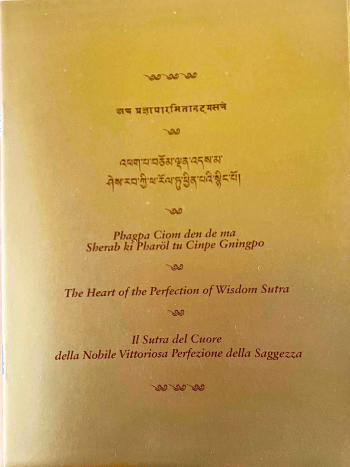
A print of the Heart Sutra in Sanskrit, Tibetan, English, and Italian sponsored by Stefano Gaviglio for the occasion of the Heart Sutra Retreat at ILTK.
The retreat has already generated momentum for future programs. ILTK has scheduled another intensive Heart Sutra meditation retreat for October 2026, fulfilling Lama Zopa Rinpoche’s expressed wish for the continuation of these teachings as shared by Ven. Roger at Kopan.
On the occasion of such an important retreat, Stefano Gaviglio sponsored the printing of 1,000 Heart Sutra booklets translated into Sanskrit, Tibetan, English, and Italian, ensuring these precious teachings remain accessible for altar practice and study. They are now offered for free at ILTK. This offering embodies the retreat’s ultimate purpose: not personal accomplishment, but the benefit of all sentient beings.
While not every participant could remain for group photos, each contributed to creating a mandala of practice that honored the lineage while adapting skillfully to contemporary needs. As these teachings continue to spread through future retreats and individual practice, they carry the potential to transform countless lives through the profound understanding of emptiness—the Heart Sutra’s ultimate wisdom to our suffering world.
With grateful thanks to Carlota Pinheiro and Fabiana Lotito for this story! We welcome the submission of news stories from those within the FPMT community. This can be a story about something you have personally completed or accomplished, about someone else who has done so, or about the FPMT center, project, or service of which you are a part. Ideal submissions will give readers reasons to rejoice, share ideas, and create connections between those in the international community. Have something to share? Please let us know!
Foundation for the Preservation of Mahayana Tradition (FPMT), is a Tibetan Buddhist organization dedicated to the transmission of the Mahayana Buddhist tradition and values worldwide through teaching, meditation and community service.
27
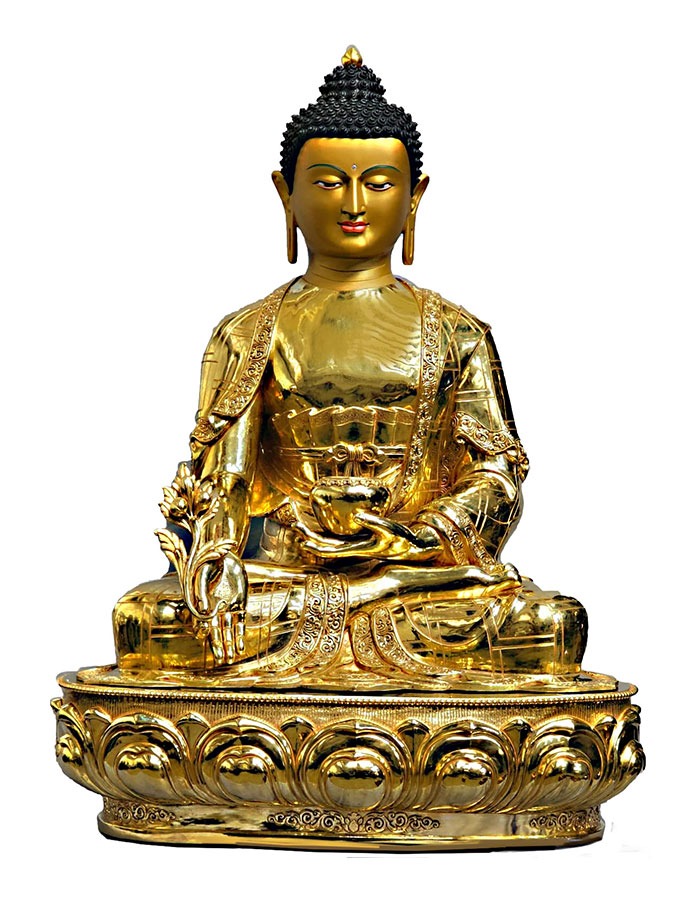
The 1.5 meter Medicine Buddha statue arriving to Sri Lanka in October 2025, which is a prototype of the five-story statue advised by Lama Zopa Rinpoche for Sri Lanka. Photo courtesy of the 5MB Project website.
Tara Lanka study group is committed to fulfilling the wish of Lama Zopa Rinpoche to build a five-story high (approximately 15 meters/50 feet) Medicine Buddha statue in Sri Lanka. Ven. Tenzin Lekdron has led this initiative and a 1.5-meter high prototype statue has been completed and will be formally offered and received in Sri Lanka in October 2025. We share a report from a friend of Tara Lanka, Srishtaa Aparna Pallavi, of the upcoming event.
By Srishtaa Aparna Pallavi
This Historic Initiative Will Be Gifted to the People of Sri Lanka in a Landmark First
In what promises to be a landmark moment for Buddhism in Sri Lanka, a 1.5-meter high statue of the Medicine Buddha—venerated in Mahayana Buddhism as the embodiment of healing and compassion—will be formally offered to the Sri Lankan people at a special blessing ceremony at Gangaramaya Temple in Colombo on October 29, 2025.
This newly built statue from Nepal marks the first time an image of the Medicine Buddha will be enshrined for public worship and ritual at a major temple in Sri Lanka. This event carries profound historical significance, bridging a centuries-old divide between the Theravada and Mahayana traditions.
Healing Beyond Sects: A Courageous Offering
Gangaramaya Temple has long been admired for its inclusive spirit, quietly housing images of Mahayana deities without actively engaging in rituals around them. The upcoming ceremony marks a turning point—it will be the first time pujas are formally conducted for a Mahayana deity at the temple, with blessings offered jointly by Theravada and Mahayana monks. This act of shared devotion stands as a powerful symbol of mutual respect, unity, and healing.
Six monks from Kopan Monastery in Kathmandu, Nepal, will travel to Sri Lanka for the event. They will lead the country’s first-ever Guru Bhumtsok Puja as well as a Medicine Buddha Puja. In the days following the ceremony, they will journey across the island performing pujas in collaboration with the Tara Lanka study group.

Ven. Tenzin Lekdron leading Medicine Buddha puja in Sri Lanka. Photo courtesy 5MB Project website.
The Vision Behind the Effort
This historic initiative is the vision of Venerable Tenzin Lekdron, the only ordained Mahayana nun from Sri Lanka. Inspired by her teacher, Lama Zopa Rinpoche, she launched the project in 2021 in response to Sri Lanka’s ongoing political and economic challenges, which have brought immense suffering to its people.
“Lama Zopa Rinpoche had initially envisioned a 15-meter statue,” said Ven. Lekdron, “but given the financial constraints and the delicate inter-sectarian climate, I chose to start with a one-meter prototype to gently prepare the ground.”
That ground now appears fertile. “It is extremely auspicious that a temple as prominent as Gangaramaya has not only agreed to house the statue but has also chosen to open it for public veneration,” she said. Local monks will conduct daily prayers and offer blessings before the statue.
Ven. Lekdron expressed deep gratitude to the many donors who contributed to the statue’s cost, with special thanks to Frank Brock and Gen Tenpa Choden for their meticulous oversight of its creation.
Acknowledging Courage and Openness
Ven. Lekdron offered heartfelt respect to the Abbot of Gangaramaya Temple, Ven. Kirinde Assaji Thero, and the senior monastic community for their openness and courage.
“It takes great bravery to support a Mahayana initiative in a predominantly Theravāda context,” she said. “Even more so when it is led by a nun—especially given that nuns often do not receive equal respect or recognition in Sri Lanka or elsewhere.”
Since 2016, the Tara Lanka FPMT study group has been quietly conducting Medicine Buddha pujas across the country, gradually cultivating familiarity with the practice as if in anticipation of this moment.
Speaking to a gathering of local devotees, Ven. Assaji Thero reflected:
“This is a Theravada country. However, the three vehicles taught by the Buddha are like different trails leading to Sri Pada Mountain. Each path offers its own experiences, but all reach the same summit. We respect all three traditions. What truly matters is healing hearts and minds.”
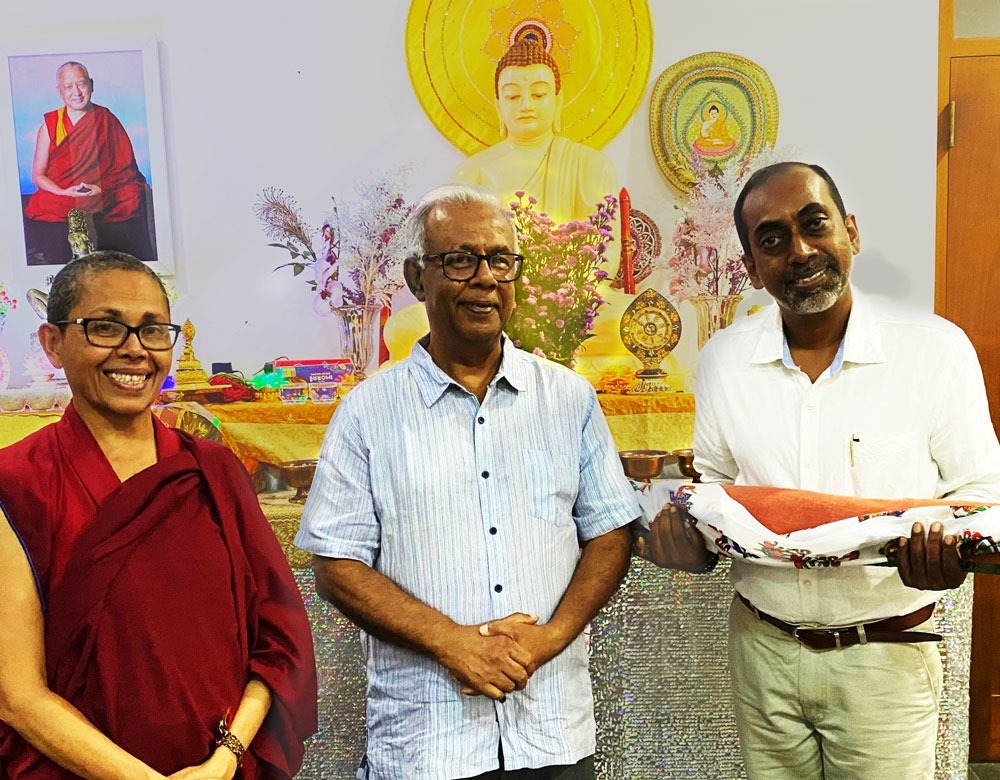
Ven. Lekdron with Sri Lanka’s Minister of Religious Affairs, Prof. Sunil Senavi, and Tara Lanka member Dr. Sunil Wijesiriwardana. Minister Senavi will visit Tara Lanka in October to discuss plans for further healing practices in Sri Lanka, inspired by the 5MB Project.
Rediscovering What’s Already Here
Ven. Lekdron noted that many traditional healing rituals in Sri Lanka already incorporate Mahayana elements—often unknowingly.
“Healers and herbalists commonly use Mahayana mantras without realizing their origin,” she explained. “So, rather than introducing something foreign, we are helping the people reconnect with what has always been part of their spiritual heritage.”
By formally integrating these practices under the compassionate presence of the Medicine Buddha, Ven. Lekdron hopes to support reconciliation, foster unity across traditions, and promote a national healing that extends beyond individual well-being.
An Invitation to the FPMT Family
Ven. Lekdron warmly invites members of the global FPMT community to take part in this historic event. Join the Guru Bhumtsok Puja and receive the blessings of the six Kopan monks during their journey across Sri Lanka, from October 28 to November 5. A full itinerary of pujas and locations will be shared upon request. You can learn more and contact Ven. Lekdron through the 5MB Project website.
With grateful thanks to Srishtaa Aparna Pallavi and Ven. Tenzin Lekdron for sharing news of this inspiring development! We welcome the submission of news stories from those within the FPMT community. This can be a story about something you have personally completed or accomplished, about someone else who has done so, or about the FPMT center, project, or service of which you are a part. Ideal submissions will give readers reasons to rejoice, share ideas, and create connections between those in the international community. Have something to share? Please let us know!
Please learn more about Lama Zopa Rinpoche’s Vast Visions for the FPMT organization to have hundreds of thousands of holy objects around the world: fpmt.org/fpmt/vast-vision/#hobjects
- Tagged: holy objects, medicine buddha, sri lanka
21
Lawudo Trek Upcoming in October
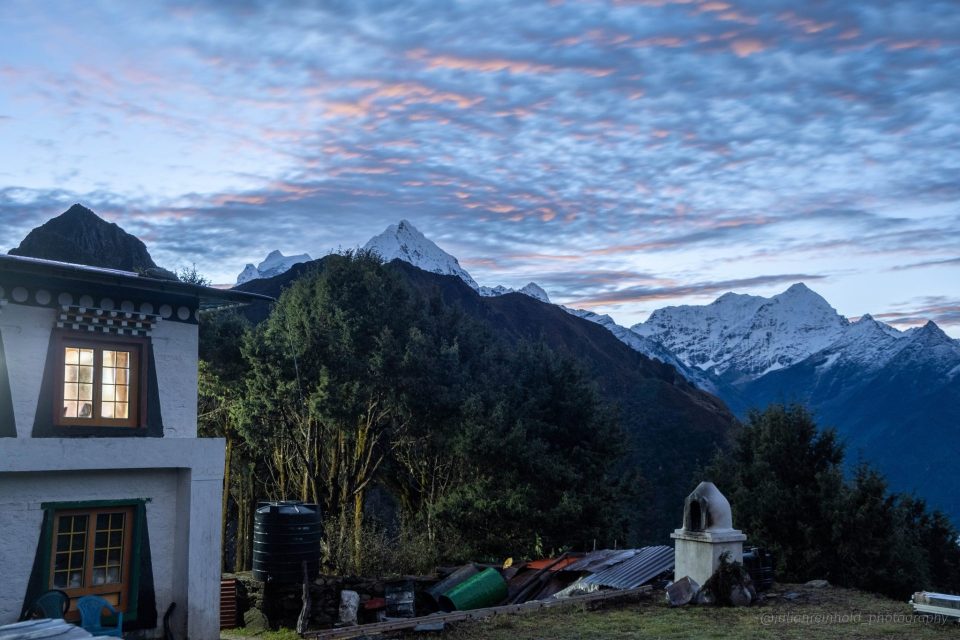
Sunrise at Lawudo Gompa. Photo courtesy of the Lawudo Trek Facebook page.
A wonderful opportunity to trek to Lawudo is upcoming—a trek and retreat from Kopan Monastery to Lawudo Gompa and back will take place October 6-21, 2025 this year.
Ven. Katy Cole will be joined by special guest Charok Lama to lead this powerful experience of teachings and practice. Since 2017 this trek has served as a fundraiser for Lawudo, Lama Zopa Rinpoche’s vision for a Guru Rinpoche Pure Land at Lawudo (Zangdok Palri), as well as flood relief last year for the people of Thame following the devastating glacial flood, and other contributions to the local community. Please see a recently published report about the 2024 Lawudo Trek with beautiful photos and details of the adventure.
Please visit the Lawudo Trek website to learn more and reserve your spot!
Please read other stories about the history and magic of Lawudo on our website.
Foundation for the Preservation of Mahayana Tradition (FPMT), is a Tibetan Buddhist organization dedicated to the transmission of the Mahayana Buddhist tradition and values worldwide through teaching, meditation and community service.
- Tagged: lawudo, lawudo trek
19
August 2025 e-News is Now Available!
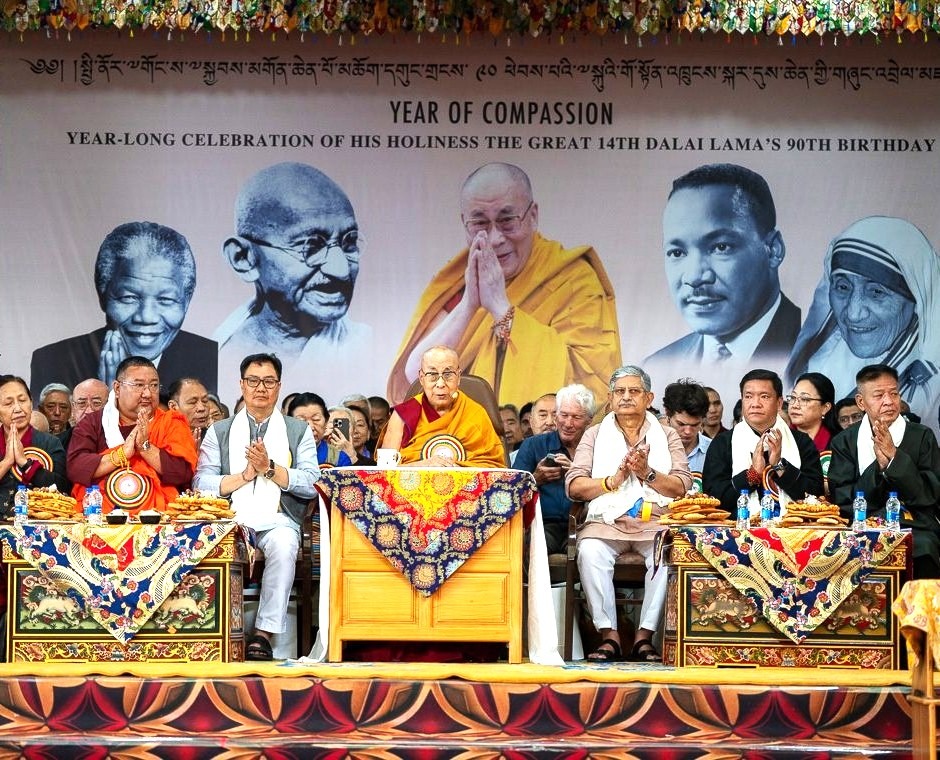
Panel of guests during the birthday celebration for His Holiness the Dalai Lama at the Main Temple, Dharamsala, July 6, 2025. Photo by Tenzin Choejar, courtesy of OHHDL.
Our August 2025 e-News is now available and brings many causes for rejoicing including:
- Teachings from Lama Zopa Rinpoche and Lama Yeshe
- Support offered to eight schools in India and Nepal
- Resources and opportunities for study and practice
- Information about an upcoming trek to Lawudo
- New opportunities to offer service in the FPMT organization
- News and stories from the FPMT community
And much more!
Please read this month’s e-news in its entirety.
Have the e-News translated into your native language by using our convenient translation facility located on the right-hand side of the page.
Visit our subscribe page to receive the FPMT International Office News directly in your email inbox.
- Tagged: fpmt enews
12
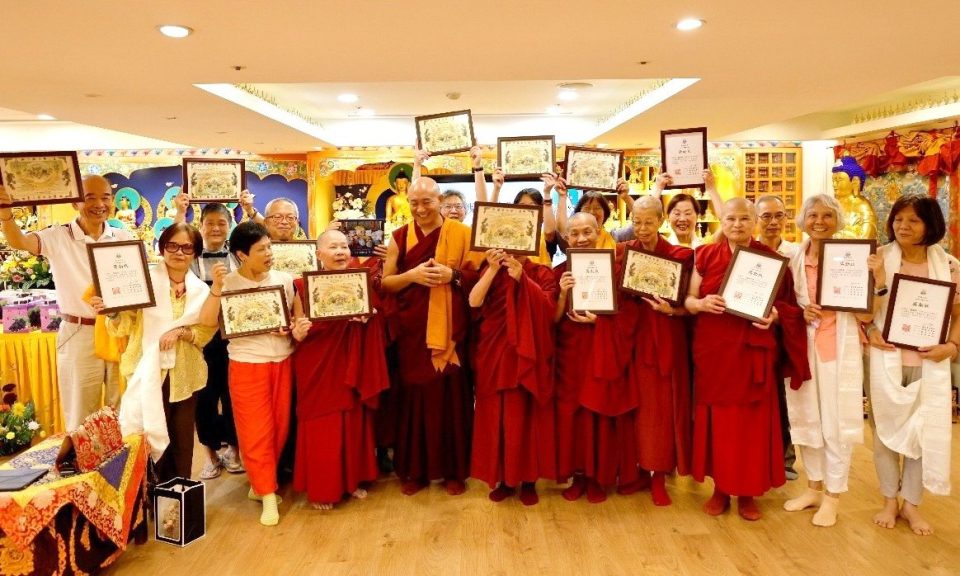
Geshe Jampa Sonam (center) with recipients of the Ornament certificate. Photo courtesy of Jinsiu Farlin.
On June 25, 2025, eleven students at Jinsiu Farlin, the Taiwanese FPMT center based in Taipei, completed 16 years of study of Ornament for Clear Realization, an FPMT Masters Program text. To honor this remarkable achievement FPMT Education Services issued a special bilingual certificate. Jinsiu Farlin Center Director, Ven. Thubten Osel, shares the story:
In 2009 Jinsiu Farlin embarked on an epic journey to offer the FPMT Masters Program subject of Ornament for Clear Realization in the form of a word commentary presented in weekly classes for an audience of 15-20 courageous students. This was an “epic” journey, because it became a series of 473 weekly classes offered over 16 years by three resident teachers: Geshe Thubten Gyurme (September 2009 to 2017), Khenrinpoche Geshe Tashi Tsethar (2017 to 2018) and Geshe Jampa Sonam (2018 to June 2025). Teacher Zhang (Zhang Fu Cheng), our translator, translated this class for 16 years!
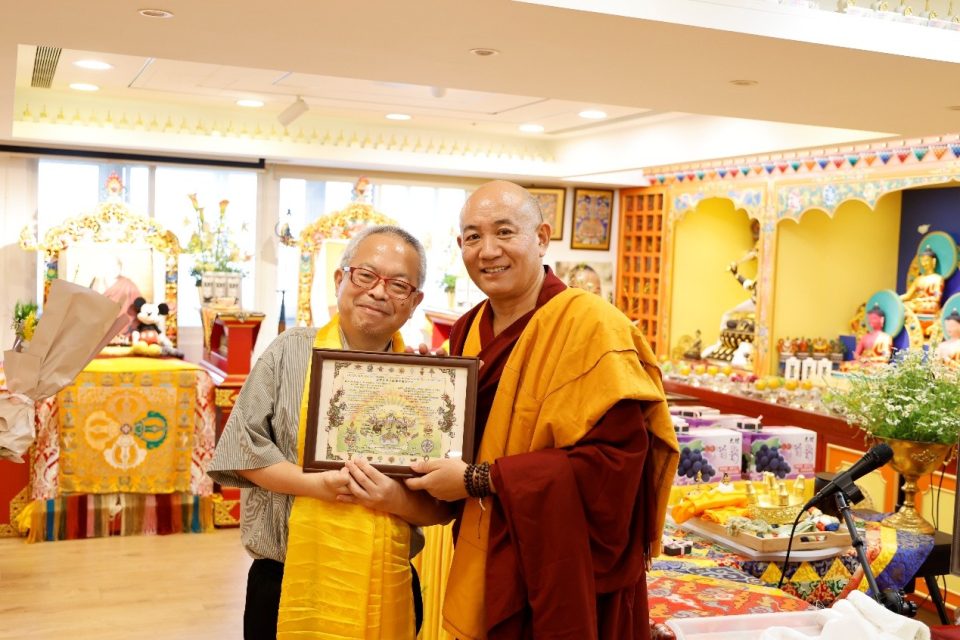
Teacher Zhang receiving a certificate from Geshe Jampa Sonam. Photo courtesy of Jinsiu Farlin
On June 25 we concluded the series of teachings with a certification ceremony. Eleven students received a completion certificate provided for this occasion by FPMT Education Services. Also honored with this certificate were the two staff members who had offered the hardworking service of providing meals and supporting the students in their study. An additional nine students who took the class in recent years received a participation certificate of encouragement offered by the center.
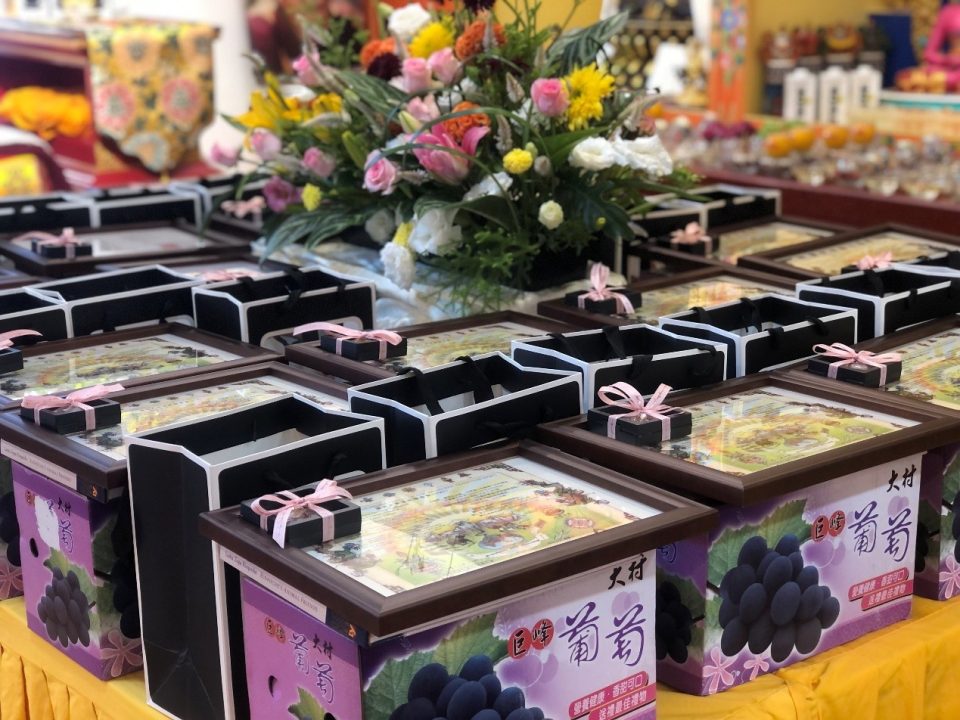
The framed certificate with gifts. Photo courtesy of Jinsiu Farlin.
The ceremony went very well! Each student received abundant gifts such as a box of grapes from a member’s grape farm, a copy of Lama Zopa Rinpoche’s recently released Rinpoche’s Animal Friends book, a bouquet of flowers, a brooch, and a khata from the center. Resident teacher Geshe Jampa Sonam handed out the certificates.
As a highlight of the ceremony we requested Gaden Trisur Rinpoche Lobsang Tenzin to bestow the oral transmission (via livestream) on the root text of Ornament for Clear Realization, and he kindly agreed. During that day we had more than 60 participants who came to attend the oral transmission in the center, and nearly 1,000 people around the world received the oral transmission online. We also requested the previous teachers of Ornament, Khenrinpoche Geshe Tashi Tsethar and Geshe Thubten Gyurme, to give advice to the students on this special day. Both teachers sent us their short video clips which were played for all participants. It was truly a special day filled with joy and gratitude.
Grateful thanks to Ven. Thubten Osel for sharing details and photos of this wonderful accomplishment and event! We welcome the submission of news stories from those within the FPMT community. This can be a story about something you have personally completed or accomplished, about someone else who has done so, or about the FPMT center, project, or service of which you are a part. Ideal submissions will give readers reasons to rejoice, share ideas, and create connections between those in the international community. Have something to share? Please let us know!
Foundation for the Preservation of Mahayana Tradition (FPMT), is a Tibetan Buddhist organization dedicated to the transmission of the Mahayana Buddhist tradition and values worldwide through teaching, meditation and community service.
1
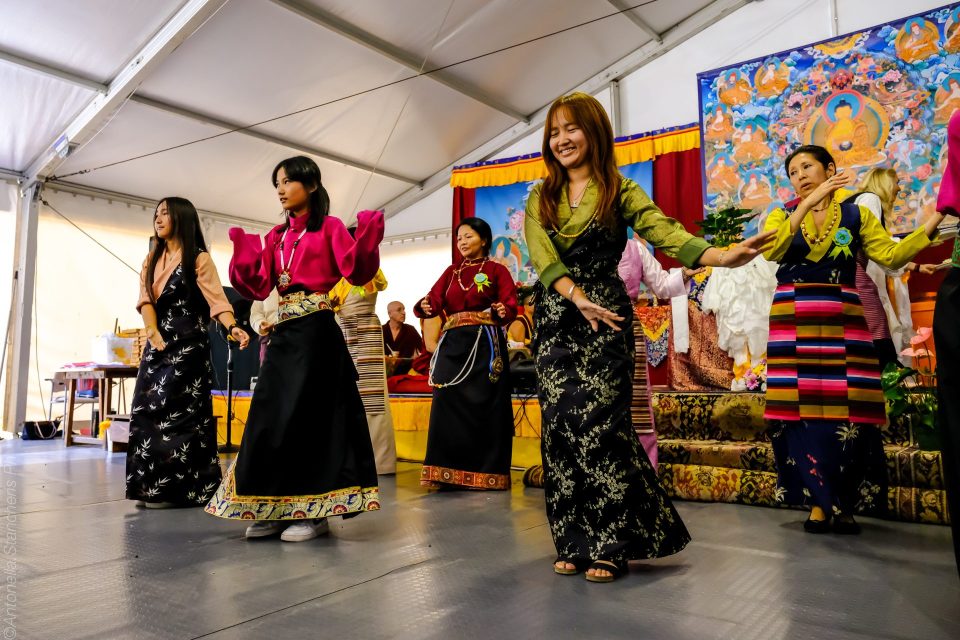
Association of Tibetan Women engaging in traditional dance. Photo courtesy of ILTK.
Recently Istituto Lama Tzong Khapa (ILTK) hosted community events centered around the celebration of His Holiness the Dalai Lama’s 90th birthday and the Year of Compassion, and in observance of Chokhor Duchen. Carlota Pinheiro and Fabiana Lotito share details of these events for great inspiration and rejoicing:
Lama Yeshe dreamed of ILTK as being something beautiful—a sacred space where people could walk the complete gradual path to enlightenment. Following Lama’s advice, the heart of everything we do here is simple: service.
Celebrating His Holiness’s 90th Birthday with the Italian Tibetan Community,
July 5-6 2025
It is fantastic to witness how the community keeps its cultural identity so intact, and how much they are willing to share it with us. After all, we owe the access to these life-changing teachings to the Tibetan people, and this is also a way of showing them gratitude.
The amount of young people that joined the 90th birthday celebration for His Holiness the Dalai Lama was astonishing. Their presence reflects not only how well the traditions are being passed down but how much hope there is for the future of the culture. The universal nature of this celebration is truly remarkable. Two full days in which everyone comes together to honor one thing only: the heart knows no borders.
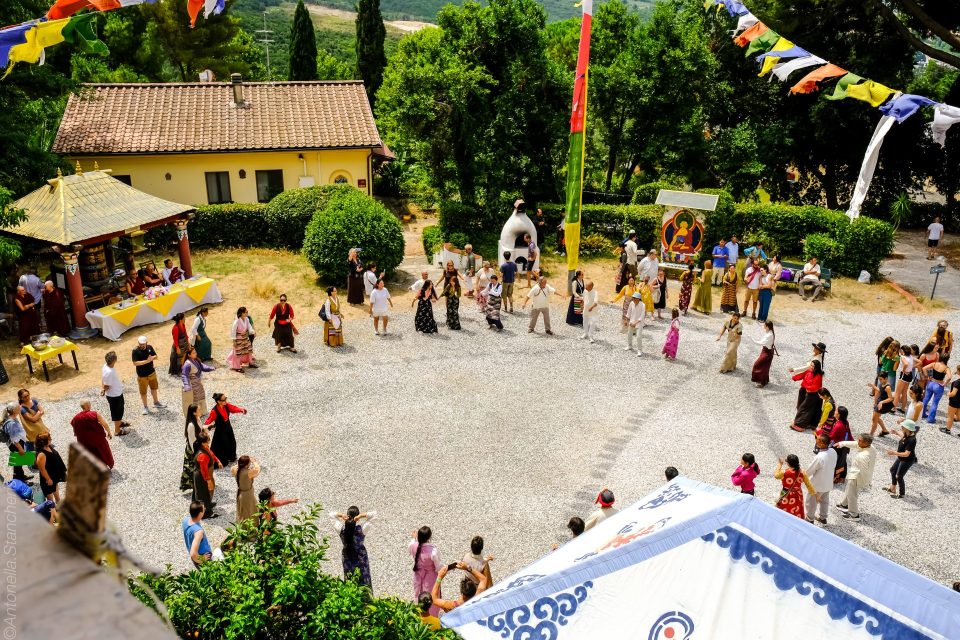
Gathering in the ILTK courtyard, July 5, 2025. Photo courtesy of ILTK.
On Saturday, July 5, more than 70 Tibetans started to gather around the courtyard of ILTK as we began the celebration. ILTK invited the Tibetan Community in Italy to come together to honor the person that brings us all together with his wonderful teachings on compassion. As the sun rose higher, so did the colors of our gardens, with colorful chubas and kids running around. This weekend means a lot not only to Buddhists, but to the whole world: celebrating the human values of love and kindness we all have within, through celebrating the person who makes it all possible—His Holiness the Dalai Lama. The weekend was a beautiful reminder of how his teachings make the world a better place and life easier to live, even in the hardest of times.
Day One: Voice for the Voiceless
On Saturday July 5 we started with something new called our Book Club of Compassion where we dive into one of His Holiness’s books each month. Everyone gathers in the coffee shop to chat about what they’ve read and share their insights and stories. Guided by Fiorella Rizzi, this is an initiative ILTK is doing to celebrate the Year of Compassion on the occasion of His Holiness’s 90th birthday celebration.
His Holiness’s new book, Voice for the Voiceless, is a profound collection of speeches, statements, and writings on the Tibetan people’s struggle under Chinese rule, their aspirations for peace; and the importance of human rights, nonviolence, and compassion. After discussing it in the book club, the opportunity and occasion was perfect to present it, surrounded by Tibetans, some of whom lived his words firsthand.
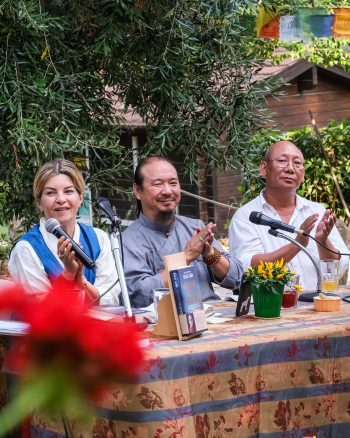
Discussing His Holiness’s new book, Voice of the Voiceless at ILTK. Photo courtesy of ILTK.
Geshe Gelek and Geshe Thenpel, the resident teachers of ILTK, sat in the tea garden, together with the president of ILTK, Lucia Landi; Marco Ventura, a university professor of “rights and religion;” the Vice President of the Tibetan community in Italy, Nyima Dhondrup; and a special guest, Sangjey Kep, the Chinese Liaison Officer for Europe in Geneva. They discussed, among many things, the importance of speaking up about the Tibetan cause every time we have the opportunity, about human rights and religious freedom, and how this matter goes much beyond politics. Sangjey Kep said, “China is not the enemy. It is the Guru.” One of the most inspiring phrases of His Holiness: “These are the teachings we need to put into practice.”
Grateful for this open discussion about such an important topic, we moved to the big tent where members of the Tibetan community gifted everyone with opera, group songs, and beautiful traditional dances.
Day Two: Songs of Home
On Sunday July 6, the Tibetans rose early to prepare the long life puja for His Holiness. The traditional laid-back and devotional atmosphere made everyone feel at home. At the end of the prayers, we rose to sing the Tibetan national anthem. The pain and love, loss and compassion was felt in everyone’s voices. It is such a united people—even though spread across the world, their home is now their community. It was a true honor to witness this celebration unfolding.
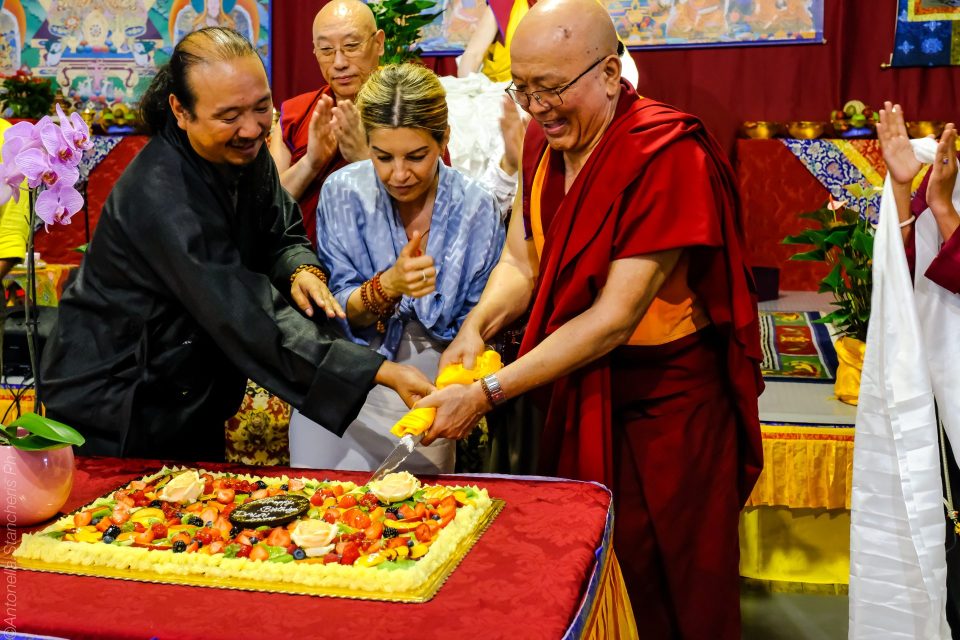
Geshe Tenzin Tenphel with the ILTK President Lucia Landi and , Sangjey Kep, the Chinese Liaison Officer for Europe, cutting cake. Photo courtesy of ILTK.
Happy Birthday was sung in three languages by a group of young Tibetan girls and the big cake was cut and distributed to all. Such a joy! We gathered again in the courtyard where ILTK’s group of workers and volunteers presented three Tibetan dances they have been practicing for months. With traditional dresses and braids and a shared love and honor for the culture, there was no distinguishing between the East and the West in this moment, everyone joined the circle and we danced in joy and laughed together with the geshes seated at the table of the puja.
Massimo Corona, co-founder and former director of ILTK, gifted us with a wonderful Q&A session in the gompa where he opened up his treasure chest of memories about His Holiness, sharing stories that sparkled with warmth—from that very first meeting all the way through His Holiness’s many visits to ILTK over the years. People asked questions, both in the gompa and following us online, all curious about what makes this figure so unique and important in our world. There was something special about listening to Massimo speak—it felt like all of of His Holiness’s teachings were somehow present in that room, woven into every story and response.
Celebrating Chokor Duchen and the International Sangha Day
On July 28 we gathered to celebrate the Sangha by inviting two monastics to tea in our tea garden, blessed with the statues of both Lama Yeshe and Geshe Jampa Gyatso (former resident teacher at ILTK).
Every month, we offer open sessions, “At the Tea Garden to Answer Your Whys” with members of the Sangha to answer questions of anyone who wishes to come. This is an initiative to create awareness, inspiration, and an effort to be accessible and inclusive to all. People came from cities across Tuscany—some for the first time—to gather in an informal setting where Dharma becomes accessible in the most relaxed way.
Since on this special we also celebrated Chokor Duchen, Ven. Raffaello opened the session with a wonderful introduction to the First Turning of the Wheel of Dharma. He told the story of Siddhartha leaving his palace to encounter the four types of suffering, and how that led to his ascetic practices and later to his enlightenment. The Buddha’s first teaching was about the Four Noble Truths, at Deer Park in Sarnath, India. This being the foundation of all Buddhist philosophy, made this occasion at the tea garden very special, where a lot of new people had the opportunity to listen to the foundations of what truly brings us together: the recognition of suffering and the wish to free all beings from it.
Afterward, people wrote their questions on small papers that Ven. Carla Tzultrim and Ven, Raffaello drew from a box, reading and responding to each one aloud. This time, the theme was “emotions.” Two nurses shared how vital these insights are for their work and how much they appreciate finding another way to ease their suffering and discover answers to their questions—something that isn’t a formal talk or retreat they can’t attend because of their demanding jobs. It was deeply inspiring to watch people of all ages come open-heartedly to sit on the grass and listen to ordained practitioners speaking directly to our hearts, as if they understood exactly what kind of suffering we each carry.
Lama Yeshe’s Legacy
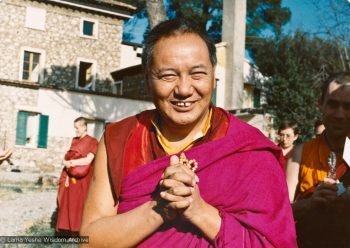
Lama Yeshe at Istituto Lama Tzong Khapa, Italy, 1983. Photo courtesy Lama Yeshe Wisdom Archive, donated by Merry Colony.
Life here at ILTK has this wonderful rhythm to it—always something happening, always new faces appearing. We love seeing fresh people join our monthly pujas, and beyond our daily meditations, volunteers gather each week for Dharma Talks. For many, these talks become their first real taste of the Dharma, which feels pretty special.
Lama Yeshe used to remind us that ILTK should serve the community and be a refuge for everyone. That spirit still guides everything we do here. As he taught, we build this mandala by offering our body, speech, and mind to others. When we’re lucky enough to encounter Buddha’s Mahayana Dharma, we naturally want to share that gift with others. He called for harmony, mutual respect, and open hearts among all members, regardless of cultural differences, united in the common goal of guiding others toward enlightenment. We are deeply grateful for the opportunity of serving, providing these spaces and welcoming everyone!
With grateful thanks to Carlota Pinheiro and Fabiana Lotito for sharing this inspiring report on recent activities at ILTK. We welcome the submission of news stories from those within the FPMT community. This can be a story about something you have personally completed or accomplished, about someone else who has done so, or about the FPMT center, project, or service of which you are a part. Ideal submissions will give readers reasons to rejoice, share ideas, and create connections between those in the international community. Have something to share? Please let us know!
Foundation for the Preservation of Mahayana Tradition (FPMT), is a Tibetan Buddhist organization dedicated to the transmission of the Mahayana Buddhist tradition and values worldwide through teaching, meditation and community service.
30
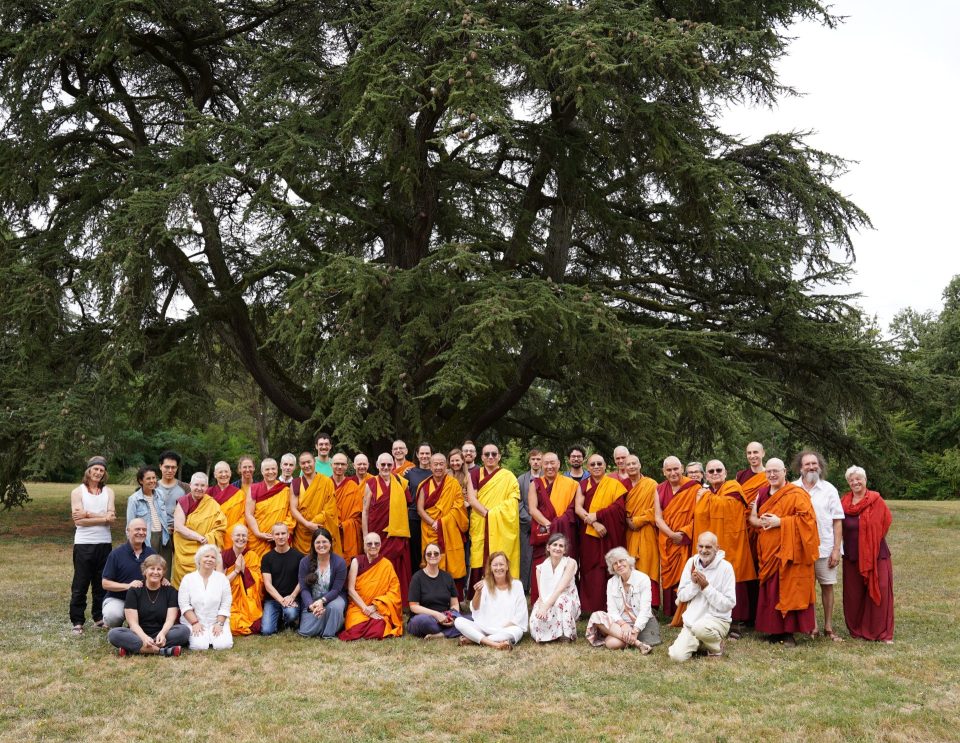
Participants in the Most Secret Hayagriva Retreat at Nalanda Monastery, July 2025. Photo by Sonam Sherpa.
A very rare opportunity of a two-week Most Secret Hayagriva Retreat occurred on grounds of Nalanda Monastery from July 11-28, 2025. One participant described this retreat as an, “incredibly blessed dimension.”
Hayagriva is the wrathful manifestation of Chenrezig, the Buddha of Compassion. The practice of Most Secret Hayagriva is extremely powerful to grant help and support and to quickly pacify obstacles. Both Lama Yeshe and Lama Zopa Rinpoche had a special connection to the Most Secret Hayagriva. As Ven. Roger Kunsang, who participated in the retreat explained, “The Most Secret Hayagriva retreat is the practice/commitment that Lama Yeshe gave to Lama Zopa Rinpoche to do every year for the protection and success of the entire FPMT organization. And now this is a commitment the whole organization is taking on.”
Nalandala Monastery shared the following report of this most auspicious and powerful retreat, please rejoice!
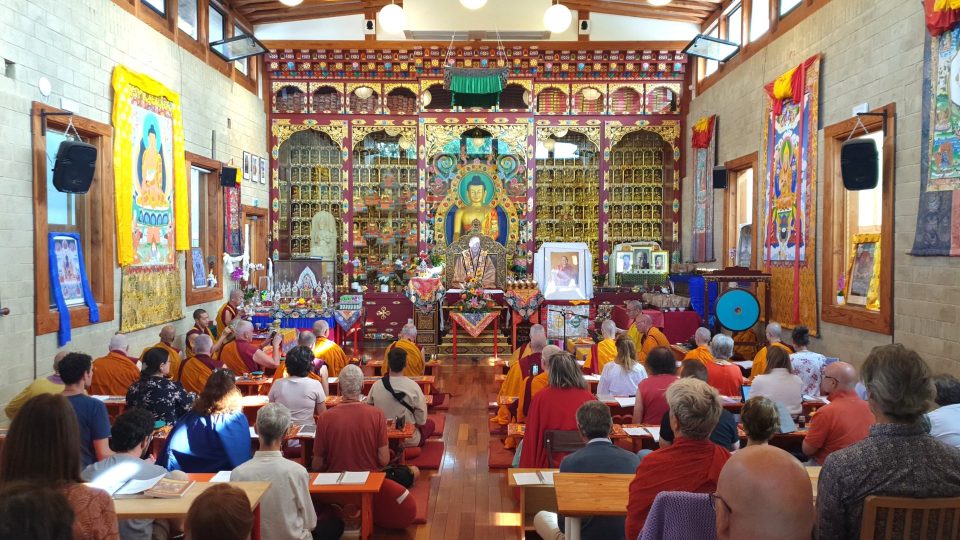
Most Secret Hayagriva Retreat at Nalanda Monastery, Kul 2025. Photo by Sonam Sherpa.
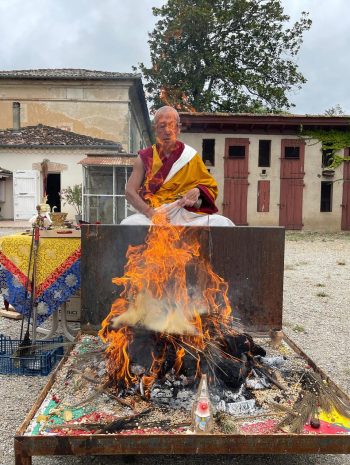
Hayagriva fire puja at Nalanda, July 27, 2025. Photo courtesy of Nalanda Monastery.
From July 11-28, 39 people participated in the Most Secret Hayagriva retreat at Nalanda Monastery lead by Geshe Thubten Sonam with the support of Genden Dargey, the main chant leader of Sera Jey Monastery, Geshe Dorjee Wangdak, Geshe Tashi Dondup, who made all the numerous traditional tormas, and Geshe Gyaltsen, one of our resident teacher. It was a very rare opportunity, as many conditions were needed to perform such an incredibly profound and ancient meditation for two weeks.
Connecting with this lineage kept unbroken from the Buddha and practiced by such realized holy beings such as Nagarjuna, Guru Rinpoche, etc. up to Sera Jey in South India nowadays, each participant felt something very special. Some had deep spiritual experiences.
”The retreat has been extraordinary. Some who already did previous deities retreats said that it is exceptional, very rare, to have such a quality, without any fault from beginning to end,” one participant shared.
We concluded the retreat with such a smooth and blessed fire puja. The next day, for Chokhor Duchen we made an extensive tsog offering to Hayagriva. Next time, Geshe Thubten Sonam will lead a shorter retreat and will give some explanations. May this happen!
Please watch a short video clip of the fire puja:
Story submitted by Nalanda Monastery. Please read more about the practice of Hayagriva and its connection to the FPMT organization.
We welcome the submission of news stories from those within the FPMT community. This can be a story about something you have personally completed or accomplished, about someone else who has done so, or about the FPMT center, project, or service of which you are a part. Ideal submissions will give readers reasons to rejoice, share ideas, and create connections between those in the international community. Have something to share? Please let us know!
Foundation for the Preservation of Mahayana Tradition (FPMT), is a Tibetan Buddhist organization dedicated to the transmission of the Mahayana Buddhist tradition and values worldwide through teaching, meditation and community service.
- Tagged: hayagriva, most secret hayagriva, nalanda monastery
27
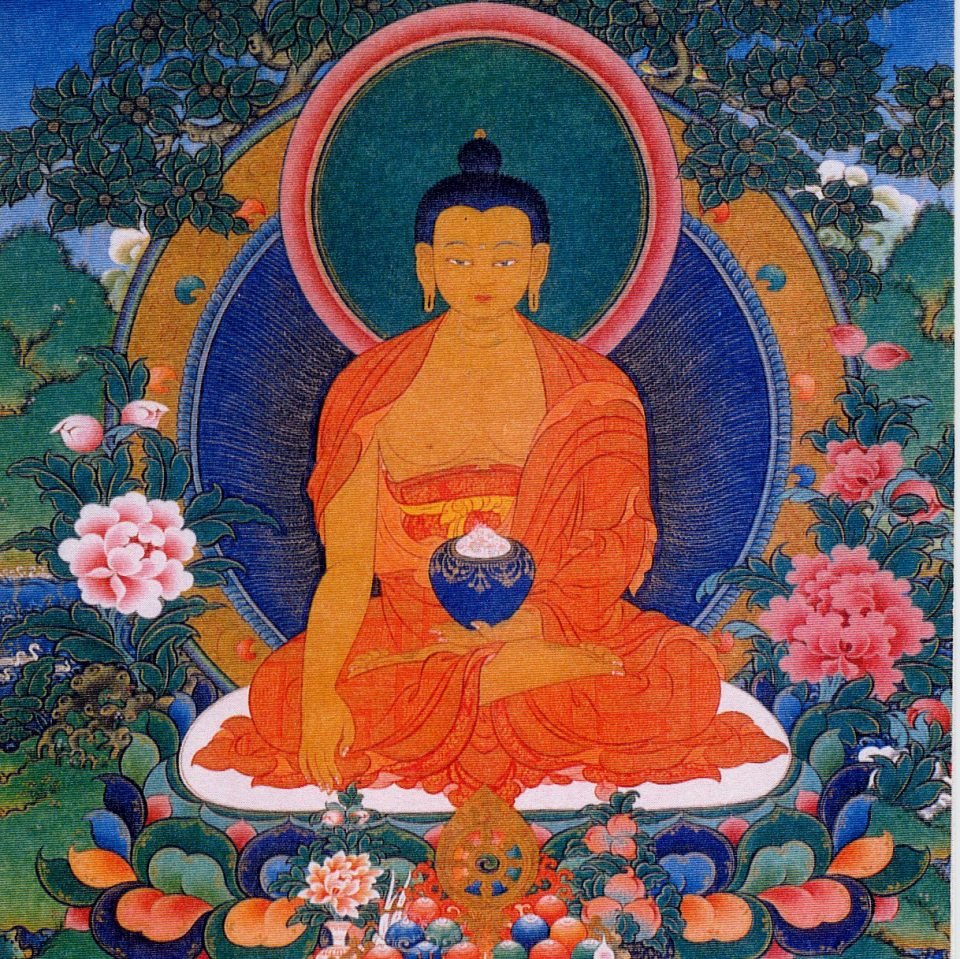
Shakyamuni Buddha
Chokhor Duchen, one of the four annual holy days of Guru Shakyamuni Buddha, and FPMT International Sangha Day both take place this year on July 28.
Please read about this special “Turning the Wheel of Dharma” merit-multiplying day, access all of Lama Zopa Rinpoche’s advice for auspicious activities and practices to do to maximize the opportunity, as well as inspiration for celebrating International Sangha Day.
Please also read about and rejoice in the various pujas and practices being sponsored and arranged on behalf of the entire FPMT organization, dedicated for the benefit of the whole FPMT organization and all beings.
Foundation for the Preservation of Mahayana Tradition (FPMT), is a Tibetan Buddhist organization dedicated to the transmission of the Mahayana Buddhist tradition and values worldwide through teaching, meditation and community service.
- Tagged: chokhor duchen
- Home
- News/Media
- Study & Practice
- About FPMT Education Services
- Latest News
- Programs
- New to Buddhism?
- Buddhist Mind Science: Activating Your Potential
- Heart Advice for Death and Dying
- Discovering Buddhism
- Living in the Path
- Exploring Buddhism
- FPMT Basic Program
- FPMT Masters Program
- FPMT In-Depth Meditation Training
- Maitripa College
- Lotsawa Rinchen Zangpo Translator Program
- Universal Education for Compassion & Wisdom
- Online Learning Center
- Prayers & Practice Materials
- Overview of Prayers & Practices
- Full Catalogue of Prayers & Practice Materials
- Explore Popular Topics
- Benefiting Animals
- Chenrezig Resources
- Death & Dying Resources
- Lama Chopa (Guru Puja)
- Lama Zopa Rinpoche: Compendium of Precious Instructions
- Lama Zopa Rinpoche: Life Practice Advice
- Lama Zopa Rinpoche Practice Series
- Lamrim Resources
- Mantras
- Prayer Book Updates
- Purification Practices
- Sutras
- Thought Transformation (Lojong)
- Audio Materials
- Dharma Dates – Tibetan Calendar
- Translation Services
- Publishing Services
- Teachings and Advice
- Find Teachings and Advice
- Lama Zopa Rinpoche Advice Page
- Lama Zopa Rinpoche: Compendium of Precious Instructions
- Lama Zopa Rinpoche Video Teachings
- ༧སྐྱབས་རྗེ་བཟོད་པ་རིན་པོ་ཆེ་མཆོག་ནས་སྩལ་བའི་བཀའ་སློབ་བརྙན་འཕྲིན།
- Podcasts
- Lama Yeshe Wisdom Archive
- Buddhism FAQ
- Dharma for Young People
- Resources on Holy Objects
- Ways to Offer Support
- Centers
- Affiliates Area
- Teachers
- Projects
- Charitable Projects
- Make a Donation
- Applying for Grants
- News about Projects
- Other Projects within FPMT
- Support International Office
- Projects Photo Galleries
- Give Where Most Needed
- FPMT
- Shop
Translate*
*powered by Google TranslateTranslation of pages on fpmt.org is performed by Google Translate, a third party service which FPMT has no control over. The service provides automated computer translations that are only an approximation of the websites' original content. The translations should not be considered exact and only used as a rough guide.When I talk of being detached, what I mean is to be simpler, more easy-going. Detachment doesn’t mean totally renouncing everything. It means that you loosen your grip and be more relaxed.







